I was dreading it. Oh, not the trip itself. Thankful to be able to travel for two months to Italy and France, I was finalizing my plans. During my time in France, I would be attending a two-week French language immersion school. But at the last minute, I was informed that the train I had planned to take from Paris to the school was not operational. As I researched other options, traveling by a different train would not only take more than twice as long, it would involve a transfer to a bus. The thought of spending so much time on the train and then having to schlepp my very heavy bag from the train station to who-knows-where the bus station was located, was a bit daunting. My only other option was to rent a car and drive the two hours from Paris.
Even stateside, I’m not a fan of renting a car. Driving someone else’s vehicle makes me nervous, especially with all the knobs, buttons, and switches that are different from my own car. A plethora of terrifying thoughts ran through my head. What if I get lost? What if I have a wreck because I’m distracted just trying to figure out how everything in the car works? What if I get a speeding ticket? What if I don’t get to the school on time because of any of the above and I miss being able to check in and end up with no place to stay that night? “What-ifs” commandeered by overwhelmed brain. Fear had set in.
To take control back from these fearful thoughts, I did several things. First, I prayed. Asking the Lord for wisdom on whether I should rent a car or not, my head took a back seat while my heart conversed with God. My desire to learn French was on my “bucket” list. So was visiting the very grand and beautiful chateaux which happened to be located not far from the school. How could I go to the school and not visit the chateaux when I was so close? Unfortunately, the only way for me to get to the chateaux was to drive. As I wrestled in prayer over what to do, my desire to see the chateaux won out over my fear of renting a car. Making the decision to rent a car, I experienced God’s peace. I wasn’t sure how I would do it, but I trusted God would be with me.
The second thing I did was to ask friends and family to pray for me while I was gone, particularly for the day I would be renting the car and driving solo to the school. James 5:16 says “The prayer of a righteous person is powerful and effective.” I had no doubt their prayers would be heard.
Thirdly, knowing I’m somewhat directionally-challenged, I selected a rental car with a GPS which, upon pick up, I requested it to be programmed in English with the school’s address typed in as the destination. In the meantime, I ensured my phone was working and I could access Google maps. (My phone’s French SIM card wasn’t working at first and that’s a story for another time!) Last but not least, I brought a paper map with me, just in case. I was armed and ready for my adventure!
Being prepared helped, but I wondered how anxious I would be as the day approached. I continued to pray, relying upon the truth found in Philippians 4:6-7 that says when we pray with thanksgiving and present our requests to God, His peace, which is beyond our understanding, especially when we consider the circumstances, fills our hearts and our minds. Although I did have “butterflies” in my stomach beforehand, when I sat in the driver’s seat, I experienced a supernatural sense of calmness and peace. Fear was gone and I knew, as the key verse today says, God would go with me. He would never leave me and I didn’t need to be afraid.
As they say, “God can’t steer a parked car”, so I put it in gear and off I went! I’d like to say I didn’t get lost, but I did get turned around a couple of times. Pulling up at the school, though, filled me with a sense of gratitude and a confidence that I didn’t need to be intimidated by a foreign rental car, speed limits that changed constantly, and signs in foreign languages. My God goes before me, preparing the way for me, and also goes with me. I don’t have to fear. Faith triumphs over fear!
Lord, I thank You for going with me wherever I go, especially when the journey is out of my comfort zone. Fill me with Your supernatural peace that overcomes the feeling of fear as I trust in You. In Jesus’ Name, Amen.
Want to subscribe to future posts? Click here.
Text and photograph copyright © 2017 by Dawn Dailey. All rights reserved. Photo of Sancerre, France, as seen from the 14th century Tower of the Fiefs.
All scripture quotations, unless otherwise indicated, are taken from the Holy Bible, New International Version®, NIV®. Copyright ©1973, 1978, 1984, 2011 by Biblica, Inc.™ Used by permission of Zondervan. All rights reserved worldwide. www.zondervan.com The “NIV” and “New International Version” are trademarks registered in the United States Patent and Trademark Office by Biblica, Inc.™
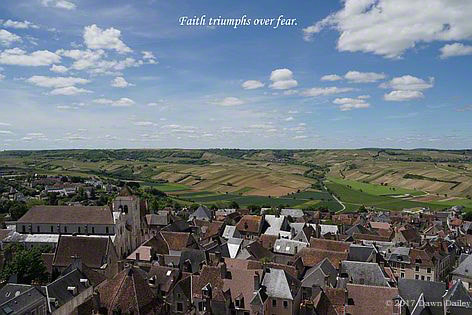
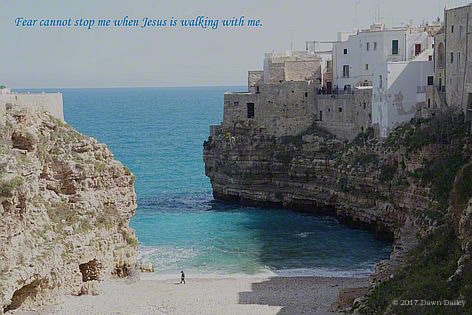

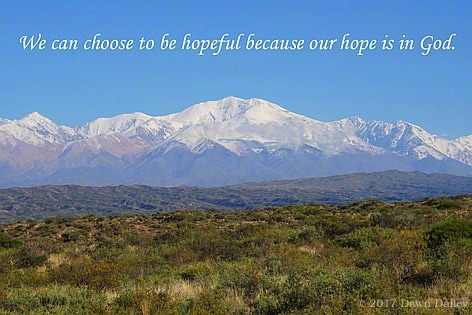
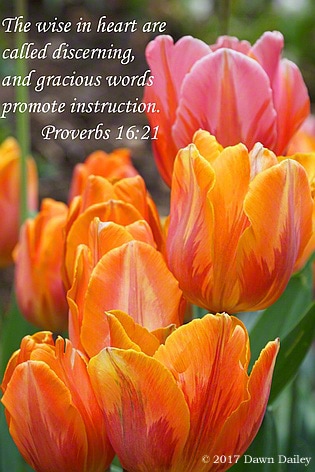

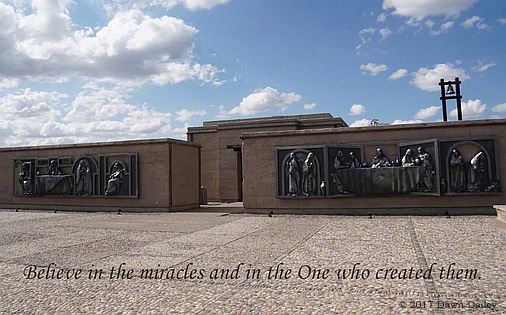



 RSS Feed
RSS Feed